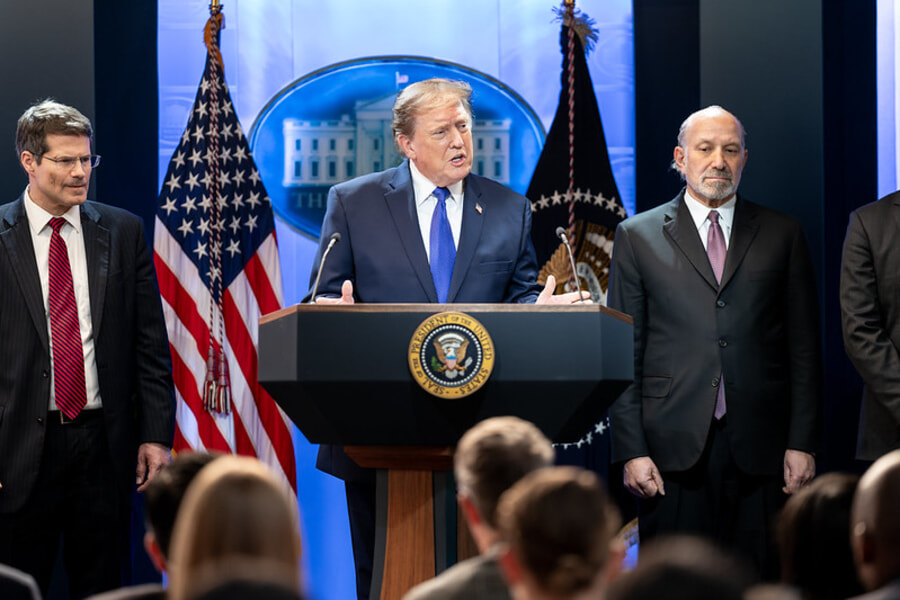The World Bank Can Address Climate and Food Security at the Same Time
Food security and climate action are intrinsically linked. The upcoming Spring Meetings offer an opportunity to address the two together.

In April, hundreds of leaders from the World Bank, the International Monetary Fund (IMF), civil society, and the private sector will converge on downtown Washington, D.C., for the so-called Spring Meetings—an annual series of events that include press briefings, seminars, panel discussions, and official meetings. Although climate adaptation and climate finance (the injection of funds needed to support this adaptation) are clearly on the agenda, one key issue is absent: food security. In the World Bank’s various climate change discussions, the focus is often on renewable energy production, hitting greenhouse gas emissions targets, and supporting the recovery from extreme weather events. This is understandable. But, again, missing from this list are some of the most significant security implications of climate change, including spikes in global hunger.
Global hunger directly impacts the World Bank’s mission of providing sustainable solutions to reduce poverty, and this year’s Spring Meetings are an opportunity to begin meaningfully integrating and implementing food security considerations into the bank’s climate finance planning. While broad agreement exists that climate finance mechanisms (such as the Green Climate Fund) need to be improved and deployed more frequently in zones of fragility, conflict, and violence (FCV settings), significant roadblocks remain. For example, ongoing debates over the debt crisis in emerging markets, a contentious geopolitical environment, and high demand for immediate emergency responses have stymied concrete action. As the slow start of the new loss and damage fund and increasingly resource-constrained humanitarian operating environment demonstrate, the international community must focus on areas of agreement to get resources into the hands of the most vulnerable communities.
Without prioritizing food security, a core element of human and climate security and a rare area of alignment is missing from the World Bank’s long-term planning. In today’s context of conflict in Gaza and Ukraine, food systems and hunger are a high-profile policy priority and represent an opportunity for progress in a siloed geopolitical environment. Multilaterally, food security is a priority for a vast network of nongovernmental organizations and private-sector actors and also intersects with core development and economic challenges such as sustainable supply chains. What’s more, in the U.S. Congress, the fight against global hunger—both at home and abroad—has strong bipartisan support.
Focusing on agri-food systems and hunger has an outsized benefit to the broader fight against climate change. Though today’s food systems are a significant contributor to climate change themselves, they are some of climate change’s most severely impacted victims. According to the Intergovernmental Panel on Climate Change, agriculture, forestry, and other land use sectors account for nearly a quarter of global greenhouse gas emissions. These emissions stem from various sources within the food system, including livestock production, deforestation, and the use of synthetic fertilizers. Simultaneously, the food system itself remains highly vulnerable to the impacts of climate change, as changing weather patterns, extreme weather events, and shifting climatic zones threaten crop yields and livestock productivity. Rural and smallholder farmers, who constitute a significant portion of the world’s food producers, are particularly vulnerable to these risks, as they often lack the resources or capacity to adapt to changing conditions.
The stability of the agri-food system is also closely interrelated with conflict, presenting clear security implications for national governments and the portfolios of financial institutions such the World Bank. As noted by experts in the World Food Program, the Center for Strategic and International Studies, and our colleagues at the Center for Climate & Security, hunger can drive recruitment for violent non-state actors, fuel irregular migration, and increase pastoral violence. While modern conflicts rarely have one core driver, hunger has the potential to serve as a threat multiplier and exacerbate broader instability, particularly if climate finance fails to reach those on the front lines of climate change. As the imminent famine in Gaza and disruptions due to the war in Ukraine demonstrate, food is also being used as a weapon of modern war, with implications beyond the borders of conflict-affected states.
Furthermore, as extreme weather events become more frequent, food and geopolitics will increasingly intertwine. For example, China’s food security challenges—made worse by climate change—have clear foreign policy implications: Chinese purchases and leases of African land and expansion of already-contentious offshore fishing practices in the South China Sea could exacerbate tensions and threaten regional and global stability. For example, aggressive illegal, unreported, and unregulated fishing and one-off collisions have the potential to escalate into a serious security concern for the United States and its regional partners. Therefore, for many policymakers, supporting sustainable supply chains and mitigating hunger worldwide isn’t just a humanitarian imperative; it’s a core national security priority.
Given the interrelated dynamics outlined above, reforming the current climate finance system is a key tool for addressing today’s development and climate security challenges, particularly as they relate to hunger. To address the critical role of food in the climate finance debate, policymakers must also understand both the mitigation- and adaptation-related aspects of the food system—mitigation meaning the reduction of greenhouse gas emissions, and adaptation meaning addressing the unavoidable impacts of climate change such as more frequent droughts, flooding, or displacement. Currently, climate finance is largely structured toward mitigation—since it’s likely easier for most financiers to estimate risks and quantitatively measure progress—rather than adaptation, which would require financiers to prepare for and invest in addressing something that hasn’t happened yet.
Food security financiers, however, can (and must) do both. In discussions of food security, policymakers have the opportunity to demonstrate how to push climate finance outside of its traditional appetite for mitigation-focused projects into adaptation as well.
On the mitigation front, investments are needed to better promote sustainable agricultural practices that reduce emissions, including efforts to prioritize soil health and biodiversity conservation, while continuing to support small farmers. Moreover, incentivizing shifts toward plant-based diets and reducing food waste can significantly reduce the carbon footprint of the food system.
In terms of adaptation, investments are urgently needed to build climate resilience within the agri-food system. While some progress has been made via initiatives such as Feed the Future and long-standing programming from the Food and Agriculture Organization of the United Nations, bolstering adaptation initiatives involves supporting smallholder farmers with access to climate-resilient seeds, sustainable water management practices, and insurance to buffer against crop losses. Additionally, investments in research and development are crucial for developing climate-resilient crop varieties and innovative farming techniques suited to changing environmental conditions. This is particularly important for U.S. foreign policy interests as U.S. investment in public agricultural research and development has fallen by a third in the past two decades, while Chinese investment has tripled.
Food systems serve as a pathway toward co-benefits, wherein emissions reduction and adaptation are paired with progress toward other sustainable development goals. Addressing the role of food in the climate finance debate requires a holistic approach that considers social, economic, and equity dimensions while also prioritizing environmental sustainability. Investments in sustainable agriculture—such as less carbon-intensive food production—can generate green jobs, improve rural livelihoods, and therefore reduce the likelihood of internal displacement or conflict. For that reason, food must be a core planning consideration for development and diplomatic actors, as well as nontraditional climate actors in the domestic and international security sector as well, such as the U.S. Department of Defense and NATO.
Ultimately, addressing the challenges within the food system—and the broader challenges related to the climate crisis—requires strategic investments that promote sustainability and resilience. But these investments won’t only benefit the climate sector; they are significant national and international security wins as well. By supporting diversified, locally adapted food systems, climate finance can directly contribute to the World Bank’s mission, support international stability, and help reduce global hunger.
Food must accompany climate on the agenda for the Spring Meetings and must be a core part of reforming international financial institutions in the years to come. Addressing one without the other is simply not possible.






